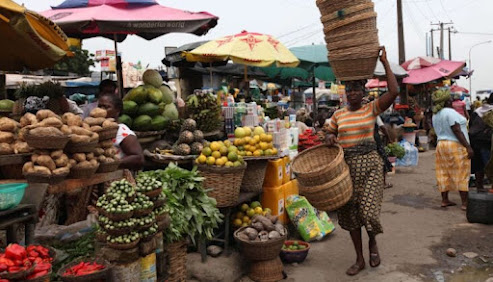By Olu Fasan
Recently, the International Monetary Fund, IMF, lamented Nigeria’ low tax revenues. Two weeks ago, when launching the IMF’s Regional Economic Outlook for Sub-Saharan Africa, the Fund’s Director for Africa, Abebe Selassie, said: “For a country like Nigeria, Africa’s most populous country, with all those development spending needs, we think it is problematic that the tax revenue to GDP is only 8-9 per cent when it should be a lot higher.”
A few years ago, in its 2019 Article IV Consultation with Nigeria, the IMF made the same point. It said Nigeria suffered from “low tax mobilisation”, adding: “The revenue base is simply too low to address the current challenges”. Compared with the sub-Saharan African average of 18.6 per cent, Nigeria’s 8-9 per cent is minuscule and truly shocking. Like the IMF, successive Nigerian governments have fretted about it.
In August 2019, President Buhari’s then chief of
staff, Abba Kyari, sent a query letter to Dr Tunde Fowler, then chairman of the
Federal Inland Revenue Service, FIRS, asking him to explain why there were
“significant variances between the budgeted tax collection and the actual
collection for the period 2015 to 2018” and why “the actual collections for the
period 2015 to 2017 were significantly worse than what was collected between
2012 and 2014”. Subsequently, in December of that year, the Buhari government
refused to reappoint Fowler as head of FIRS. Fowler’s query and denial of
another term of office reflected the anxiety within government about the
perennial low tax generation amid deep fiscal challenges.
When Bola Tinubu became president, he made boosting
Nigeria’s tax revenue a priority, and said his administration would increase
Nigeria’s tax-to-GDP ratio to 18 per cent by 2026. In July 2023, Tinubu
inaugurated the Presidential Committee on Fiscal Policy and Tax Reforms, headed
by Taiwo Oyedele, a tax expert at the accounting firm PwC. The committee
submitted its report in October 2023, highlighting what it described as “quick
wins” through the simplification and digitisation of the tax regime. Last week,
Tinubu met Bill Gates, the Microsoft founder, at the World Economic Forum, WEF,
in Saudi Arabia, and they discussed how digital technology could be used to
ease tax collection in Nigeria. Gates told Tinubu he would work with his
administration to create a digital identity platform to ensure payment
efficiency and make tax collection easier.
But while tax administration is
extremely weak in Nigeria, the absence of a digital payment system is not the
reason most rich people don’t pay tax or pay the requisite amount of tax. For
instance, the Federal Ministry of Finance once said that just 241 people paid
more than N20 million in personal income tax in a year, while the then head of
the Federal Inland Revenue Service was quoted as saying that “over 6,772
billionaires don’t pay tax”. Surely, it cannot be because of the lack of a
digital payment system that the billionaires were not paying tax. No. The
problem, simply put, is corruption. A lot of rich people avoid and evade tax
and get away with it, aided and abetted by complicit tax officials, who are in
the pocket of wealthy tax dodgers. Moreover, the government grants tax
exemptions to many favoured companies and wealthy individuals, effectively
giving subsidies to the rich.
Yet, the tax-dodging
billionaires are not the only problem. Are there enough people able to pay tax
in Nigeria? In most countries, the middle classes, the micro, small and medium
enterprises, MSMEs, the employed and the self-employed, collectively, account
for the largest proportion of tax payments – about 70 per cent in the UK. But
the strength of the economy determines the strength of these categories of
taxpayers and, thus, the robustness of the tax intakes. As Martin Woolf, the
chief economics commentator of the Financial
Times, rightly put it, “the main source of greater prosperity and
higher fiscal revenue must be faster economic growth”. Truth is, tax revenue is
a function of economic activities.
Unfortunately, the Nigerian
economy is not producing enough taxpayers. The middle classes are disappearing,
and those left are mostly managing to eke out a living. According to an
estimate by the International Labour Organisation, ILO, 93 per cent of all
employment in Nigeria is in the informal sector. And, of course, everyone knows
that most of those in the informal sector don’t pay tax. First, because they
earn very low income or depend on a daily income to survive. Second, because
the state cannot even track them for tax purposes.
In his book, Reclaiming the Jewel of Africa, Dr
Segun Aganga, a former Minister of Industry, Trade and Investments, said that
MSMEs account for about 48 per cent of Nigeria’s GDP, but added: “Most MSMEs
are nano, micro and small businesses that do not make sufficient profit to pay
high tax or they are not in the tax net.” If those accounting for 48 per cent
of a country’s GDP can’t pay tax, where will high tax revenues come from?
Indeed, according to one analysis, 67 million of Nigeria’s labour force of 77
million are not registered taxpayers.
So, it’s not rocket science: any
economy where businesses and individuals are not earning enough to pay high
tax, or to pay tax at all, will have a small tax base and a low tax revenue.
Thus, to boost its tax revenue intakes, Nigeria needs a robust economy, needs
businesses of all sizes to flourish and create well-paying jobs and needs to
incentivise those in the informal sector to join the formal, tax-paying
sector.
But there’s another problem:
systemic non-compliance with tax requirements. A Nigerian once told the Financial Times: “In Nigeria, the
government pretends to tax people and people pretend to pay.” But why is there
such poor tax-compliance in Nigeria? Well, because the Nigerian state has
violated the social contract with the people and can’t induce loyalty.
*Dr. Fasan is a commentator on public issues


No comments:
Post a Comment